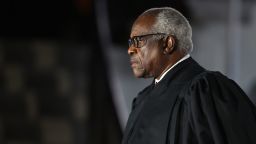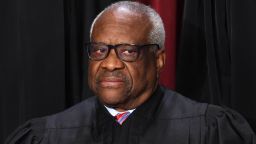Editor’s Note: Steven Lubet is the Williams Memorial Professor Emeritus at the Northwestern University Pritzker School of Law. He is coauthor of Judicial Conduct and Ethics (5th edition) and has written many other books. The views expressed in this commentary are the author’s own. View more opinion on CNN.
Supreme Court Justice Clarence Thomas has had to explain decades of omissions on his annual financial reports. The most recent revelation, as reported by ProPublica, is that Thomas did not mention Republican donor Harlan Crow’s private school tuition payments for the justice’s grandnephew, whom the justice and his wife, Virginia Thomas, were raising “as a son.” That was a direct financial benefit to the Thomases, but it appeared nowhere on the justice’s disclosure statements mandated by the Ethics in Government Act.

The discovery is just the latest to cast a pall on Thomas for providing flimsy excuses for failing to make disclosures on these reports. As a Supreme Court justice, Thomas routinely interprets complex statutes that affect millions of Americans, priding himself on close adherence to the text. It beggars belief that he could repeatedly misinterpret plain statutory requirements and simple instructions on his annual disclosure reports.
In the case of the private school tuition, Thomas’ close friend Mark Paoletta released a statement on Thursday acknowledging Crow’s generous payments for the justice’s greatnephew at two schools for at least the 2006-07 and 2007-08 school years, which may have totaled over $100,000 by the calculations of ProPublica based on the publicly available tuition rates. The money was paid directly to the schools at Crow’s suggestion since Thomas and his wife were “struggling to find a school where they could send their great nephew,” according to Paoletta, a lawyer who has represented Virginia Thomas. The gifts were not included on Thomas’s annual disclosure reports, according to ProPublica.
The payments were excludable from reporting, Paoletta said, because they were gifts to the student rather than the Thomases. Although gifts to a justice’s minor children must ordinarily be disclosed, Paoletta found an escape route. “The definition of a ‘dependent child’ under the Ethics in Government Act … does not include a ‘great nephew’” or ward, he explained. It is limited to a “son, daughter, stepson or stepdaughter.”
Paoletta does not acknowledge the inconvenient truth that the payments were reportable gifts to Thomas himself. I have never heard of adolescents who pay their own tuition, and the boarding school arrangements were made with Thomas’ participation and approval, according to Paoletta’s statement.
Is there any doubt that most parents would consider it a wonderful gift for their dependent child to be provided an expensive education beyond their own means? A few years earlier, Thomas himself disclosed a different donor’s $5,000 “education gift” for the same child.
It is indeed admirable that the Thomases, as Paoletta put it, “devoted twelve years of their lives to helping a beloved child in desperate need of love, support, and guidance,” while encountering “immeasurable personal and financial sacrifices.” But there’s no question Crow’s largesse financially benefited Thomas by saving him, as a legal guardian, from making hefty tuition payments on his own.
Unfortunately, that was not the first time Thomas attempted to justify nondisclosure with a dubious interpretation of the law.
Following ProPublica’s initial report last month on Thomas’s decades of lavish vacations at Crow’s expense, the justice released a cryptic statement via the Supreme Court. “Early in my tenure at the Court,” he wrote, “I sought guidance from my colleagues … and was advised that this sort of personal hospitality from close personal friends, who did not have business before the Court, was not reportable.”
The justice’s explanation of an earlier nondisclosure was even less plausible. In 2011, Common Cause reported that Thomas failed to include his wife’s employment on his disclosure forms – as required by the Ethics in Government Act – for at least five years, from 2003-2007, when she earned at least $686,000 from the conservative Heritage Foundation.
Bloomberg News has now learned that those nondisclosures were reviewed in the early 2010s by the financial disclosure committee of the Judicial Conference of the United States, which decided that Clarence Thomas had not acted “willfully” and declined to take formal action.
Those nondisclosures raised concerns for at least two judges on the conference, however, one of whom said that what he described as Thomas’ “material omissions” called for further inquiry that could have resulted in a referral to the attorney general if the information in the omissions warranted it. Their position was overwhelmingly rejected by the conference.
Thomas ultimately amended the spousal employment sections on 20 years of financial reports, claiming that the required information “was inadvertently omitted due to a misunderstanding of the filing instructions.”
Get our free weekly newsletter
Even if it is possible to locate an ambiguity, loophole or bypass in the financial reporting law as Thomas and his defenders have repeatedly done, a justice who respects the public’s right to information — codified in the ethics law in 1978 by a bipartisan congressional majority — would always err in favor of disclosure. He would not blame unnamed, and perhaps deceased, colleagues for his own decisions or assert improbable misunderstandings of straightforward rules or conjure the narrowest possible interpretation of his obligations.
Supreme Court justices have life tenure. Short of impeachment, the only corrective for a justice’s questionable conduct is public criticism. That is why full compliance with financial disclosure laws is so important, and why Thomas’ evasiveness is so wrong.




